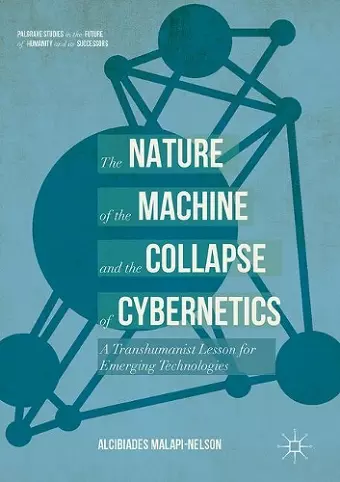The Nature of the Machine and the Collapse of Cybernetics
A Transhumanist Lesson for Emerging Technologies
Alcibiades Malapi-Nelson author
Format:Hardback
Publisher:Springer International Publishing AG
Published:13th Jul '17
Currently unavailable, and unfortunately no date known when it will be back

"The Nature of a Machine and the Collapse of Cybernetics exemplifies how critical philosophy of science should be done in our times. Malapi-Nelson conducts a close forensic examination of why cybernetics -- perhaps the twentieth century's most visionary science-based worldview - failed to live up to its ambitions. His diagnosis points to neither a failure of imagination or technology. Rather the culprit lay in a fundamental metaphysical ambiguity in the minds of the field's founders: Is the cybernetic machine supposed to be a concrete model or an ideal object? As Malapi-Nelson astutely observes, a similar ambiguity faces transhumanism's appeal to 'Humanity 2.0' today. This point makes the book essential reading to anyone interested in advancing a conceptually coherent vision of human enhancement." (Steve Fuller, Auguste Comte Professor of Social Epistemology, University of Warwick, author of "Humanity 2.0") "Cybernetics had a meteoric rise with even greater promise when it took part in the Macy Conferences, with brilliant and famous participants, before suddenly and mysteriously imploding. Like a detective story, this book investigates the true culprit bringing about its sudden and unexpected end. And the unexpected culprit turns out to be... well, I strongly recommend that you read this well researched book to find out."(Jagdish Hattiangadi, Professor of Philosophy and Science & Technology studies, York University, Canada) "This work is of great interest to philosophers, students of technological history and anyone interested in the future of humanity's relationship to new technological development. Cybernetics rose and fell quickly. Malapi-Nelson neatly ties this history to current trends in the "transhumanist" movement, and sets some possibilities for what might be, and, importantly, what might become dead ends." (Dan McArthur, Professor of Philosophy, York University, Canada) "Alcibiades Malapi-Nelson offers an informed and engaging philosophical history of the cybernetics movement. By bringing together intellectual history and the philosophy of technology, he elucidates "the nature of machine" at the heart of cybernetics and subsequent transhumanist thought." (Michael Pettit, Professor of Psychology, York University, Canada)
This book is a philosophical exploration of the theoretical causes behind the collapse of classical cybernetics, as well as the lesson that this episode can provide to current emergent technologies.
This book is a philosophical exploration of the theoretical causes behind the collapse of classical cybernetics, as well as the lesson that this episode can provide to current emergent technologies. Alcibiades Malapi-Nelson advances the idea that the cybernetic understanding of the nature of a machine entails ontological and epistemological consequences that created both material and theoretical conundrums. However, he proposes that given our current state of materials research, scientific practices, and research tools, there might be a way for cybernetics to flourish this time.
The book starts with a historical and theoretical articulation of cybernetics in order to proceed with a philosophical explanation of its collapse—emphasizing the work of Alan Turing, Ross Ashby and John von Neumann. Subsequently, Malapi-Nelson unveils the common metaphysical signature shared between cybernetics and emergent technologies, identifying this signature as transhumanist in nature. Finally, avenues of research that may allow these disruptive technologies to circumvent the cybernetic fate are indicated. It is proposed that emerging technologies ultimately entail an affirmation of humanity.
“Anyone interested and involved in pervasive computation and ubiquitous machine learning will find this book makes stimulating reading.” (J.J. Ramsden, Journal of Biological Physics and Chemistry, Vol. 21, 2021)
“Cybernetics, an approach for understanding control and communication in a very general way that applies to both machines and living systems, thrived as a movement for about a decade after WW II. … This is a technical scholarly work with ample primary source citations … . Recommended. Upper-division undergraduates through faculty and professionals.” (D. Bantz, Choice, Vol. 56 (1), September, 2018)
ISBN: 9783319545165
Dimensions: unknown
Weight: 5005g
299 pages
1st ed. 2017